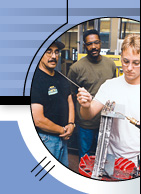


HVAC - FAQ
Q:
What is the graduation rate of the students that start this course?
A: Our statistics tell us that
we have a 70% success rate and of those 100% will find employment. From
1997 to 2005 the average rate has been 62.5% of starters will complete.
For comparison, the completion rate for a traditional 2 yr AA degree is
37.3%, for a Liberal Arts AA degree 36.8%, for a traditional 4 yr BA degree
41% and a Liberal Arts BA degree 27.6%.
Q: Can I work while I go to school?
A: Yes, many do. School hours are
from 8AM to 3PM with some time for homework and study as your schedule
permits. Work schedules can usually be arranged around these times.
Q: Is there job placement when I graduate?
A: Many employers visit the school
during the year to see what the students are doing and learn who’s
who. There is a BTC job placement office but our students rarely have
to use it.
Q: How much do I need to spend on tools?
A: Around $1300.00 depending on
your choices. Our list covers only what’s needed to get through
the program and start you out in the trade. You may or may not need other
tools depending on where you end up.
Q: Can I get hurt?
A: Most definitely. You’ll
be working with real equipment, rotating fans and motors, live electrical
circuits up to 460 volt three phase, hot boilers, furnaces, and torches,
ultra cold refrigeration (minus 80 Celsius) and chemicals. That’s
why the first week is nothing but safety, and safety is included at each
step of your education. Nothing is more important to you and to us and
we treat it that way.
Q: How long is the course, how many hours a day?
A: It takes two years to complete
our program, summers off, six hours a day.
Q: What can an employer expect from a graduate?
A: Someone with a good grounding
in most of the types of equipment that’s installed today. Someone
with enough theoretical background to be able to figure out what they
haven’t seen yet or that hasn’t been built yet. Someone that,
after a brief period of indoctrination into the company’s procedures,
will become a productive member of their team.
Q: What do you do?
A: That depends on what you’re
interested in. You may want to service residential heating equipment.
You’ll go into people’s homes and ensure that their furnace
runs properly. You’ll check voltages, gas pressures, firing rates,
temperature rises, air flows, cleanliness of components and more. You
might like refrigeration; in that case you may work on the equipment in
the supermarket that keeps food cold. In short, you’ll use tools,
instruments, and your good sense to fix things.
Q: What would it take for me to do this?
A: First, some training. You’re
in the right place for that. Then apply some consistent effort during
your two short years with us. Sorry but nothing worth having comes without
effort.
Q: What kind of person would like to do this?
A: Someone with curiosity, mechanical
aptitude, good communication skills.
Q: Is it a difficult course?
A: That depends on your background;
probably most of our students have found that they learn by doing. The
academic work is always in conjunction with a corresponding hands-on lab
portion to help reinforce what you have to learn.
Q: Is it interesting or is it repetitious?
A: I would say it’s interesting,
you seldom spend more than one week with a particular machine, not long
enough to be bored. The pace is fast but you go at your rate. By the end
of the program your rate has to be close to what your future employer
expects.


